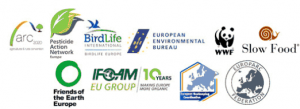 Following months of pressure on the political process in Europe from civil society organisations, beginning in November and continuing today, Arc2020.eu has learned that some progress has been made on protecting Ecological Focus Areas (EFAs).
Following months of pressure on the political process in Europe from civil society organisations, beginning in November and continuing today, Arc2020.eu has learned that some progress has been made on protecting Ecological Focus Areas (EFAs).
Arc2020 understands that yesterday’s College of Commissioners meeting added an important phrase to the document produced, namely the Delegated Act Supplementing Regulation (EU) No 1307/2013 of the European Parliament and of the Council of 17 December. “Member States may… establish additional conditions notably with regard to production methods.”
This Delegated Act is due to be released today in full.
Equally importantly, more weighting has also given for some landscape features in the EFA annex.
Here are the details on this, as seen by Arc2020.eu in another, accompanying document which is already in the public domain, entitled EUROPEAN COMMISSION MEMO Brussels, 11 March 2014 Delegated acts on the CAP Reform – an explanation of the main elements.
“A subject that was heavily discussed was the specification of the criteria that qualify the different areas listed in the Basic Act that can be considered ecological focus area (EFA). For some production-related EFAs, it will be up to Member States to define whether any conditions should be foreseen as regards the production methods. While taking into account efforts already made by farmers, these criteria ensure the safeguarding and improvement of biodiversity on farms. For instance, regarding areas with nitrogen-fixing crops, Member States will have to make sure that only areas with nitrogen-fixing crops that are contributing to the objective of improving biodiversity are recognised as EFA.” (emphasis added)
What this first change means is that, yet again, this CAP has seen a De-Europeanisation – a delegation to the Member State for contentious decisions. However, it means that Ministers have not succeeded in their attempt to railroad this idea of allowing pesticides and mineral fertilizers into EFAs, which is important.
So again, as for much of the rest of the CAP, important decisions will be decided by individual member states. The positive here is that pressure that can be applied in each region and country, to shape what happens in EFAs.
In other words, banning pesticides and mineral fertilizers could be an “additional condition”.
That more weighting has been given for some landscape features is noteworthy too, and perhaps more of a victory for nature and sustainable agri-food services such as pollination. Here again are the details on this, as seen by Arc2020.eu in the EUROPEAN COMMISSION MEMO.
“The delegated act also establishes, as foreseen in the Basic Act, the conversion (to ease the measurement of certain types of EFA) and weighting factors from 0.3 to 2.0 (that reflect the differences in terms of importance for biodiversity) to be applied to different types of EFA. For example, hedges will have a weighting factor of 2 – such that a hedge of 5m2.will be considered as 10m2 of EFA – while a feature such as catch crops will have a coefficient of 0.3, i.e. 1m2 of coppice is equivalent to 0.3m2 of EFA.” (Emphasis added)
As it is indeed the case that hedges are more important for biodiversity than catch crops, this is a positive move.
According to a release from the European Commission yesterday “There now follows a two-month period during which both the European Parliament and the Council will scrutinize the texts. In the absence of objections from both institutions the delegated acts will be published together with the corresponding implementing acts, so as to allow Member States to decide how to implement the reform of the CAP at national or regional level.” (They add: The scrutiny period could be extended to four months at the request of one of these institutions.)
More information on Delegated Acts (Source: EU Commission)
Background
Article 290 of the Treaty on the Functioning of the European Union allows the legislator (i.e. the European Parliament and the Council) to delegate to the Commission the power to adopt non-legislative acts of general application to supplement or amend non-essential elements of a legislative act (quasi-legislative acts). These are the Delegated Acts.
The ten delegated acts supplementing the four basic Regulations lay down rules in relation to:
- direct payments,
- integrated administration and control system and conditions for refusal or withdrawal of payments and administrative penalties applicable to direct payments, rural development support and cross compliance,
- requirements related to the agricultural products benefiting from private storage aid,
- fruit and vegetables and processed fruit and vegetables sectors,
- aid for accompanying measures in the framework of a School Fruit and Vegetables Scheme,
- support programmes in the sectors of olive oil and table olives,
- measures under the national support programmes in the wine sector,
- support for rural development,
- paying agencies and other bodies, financial management, clearance of accounts, securities and use of euro,
- public intervention expenditure.
Arc2020 Comment: it is of course clear that in the efforts to allow pesticides and mineral fertilizers into ecological focus areas, the use of the phrase “non-essential” above in describing Delegated Acts is questionable to say the least. We will, rest assured, continue to keep a watchful eye on these legislative manoeuvres as they unfold, and continue to keep you informed.





